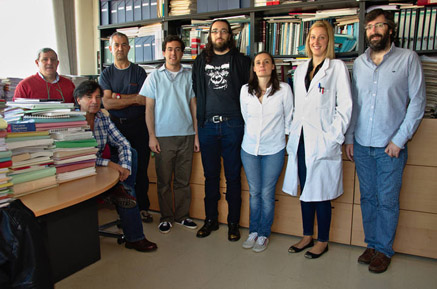A mutation of a gene is responsible for the development of hereditary sudden death and cardiac abnormalities. This emerges from a study, conducted by researchers from Oviedo and Asturias, who have sequenced the genome of Spanish patients with hypertrophic cardiomyopathy.

Researchers of the University of Oviedo
The Hypertrophic cardiomyopathy is a relatively common disease, that is a leading cause of sudden death, in young adults, reports the University of Oviedo.
In recent years, the study of familial cases of this disease has revealed several genes, whose mutations cause their development, in approximately 50% of patients; however, are completely unaware of the genes, causing hypertrophic cardiomyopathy, in the remaining patients with this pathology.
The study, published in the journal Nature Communications, has identified a new inherited form of this disease and find the mutated gene, responsible for its development.
This research team has used the new techniques of genomic analysis, developed in the laboratory of Biochemistry and Molecular Biology, in the University of Oviedo, as a part of the deciphering of the genomes of cancer.
Researchers have concluded, that "mutations in the CNLF gene, encoding a protein called filamin C, cause hypertrophic cardiomyopathy, in eight of the families studied", said Dr. S. Xosé Puente.

Figure representing a cardiac molecule with mutant Filamin C
After discovering these mutations, the research team analyzed the mechanisms underlying the development of the disease, which has demonstrated, say the first authors signers of the article, Rafael Gutierrez and Ana Valdes-Fernandez: "The mutations, in CNLF, cause the formation CNLF aggregates of these proteins, in the cardiac muscle, that are accumulated over time and prevent the proper functioning of the heart".
This discovery has important and immediate clinical applications, because according to the doctors Eliezer Coto and Jose Julian R. Reguero, "it will allow for genetic counseling, in families, and identify mutation carriers in CNLF, which are subject to ongoing clinical monitoring". "If necessary, they implant a defibrillator, that avoids the process that triggers sudden death in these patients", they concluded.
The work was led by Dr. Carlos Lopez-Otin and Dr. S. Xose Puente, from the Institute of Oncology, in the University of Oviedo, and has enjoyed the participation of groups of doctors Eliezer Coto, Jose Julian R. Guerrero and Aurora Astudillo, from the Central University Hospital of Asturias.
The work, in the institutions participating in this project, is funded by the Ministry of Economy and Finance, the Carlos III Institute of Health, the Social Work Cajastur, the Botin Foundation and the Asturcor Foundation.
Well, I think this news is so interesting and I hope that all of these researchers can strengthen this project, to help millions of people, not only in Spain but throughout the world.
Until my next post, kind regards,
Luis.
Sponsored by Costaluz lawyers.
Please click below:
